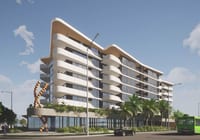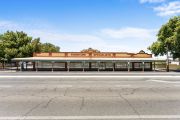
BaptistCare goes big in seniors living with $140m deal
In a deal worth an estimated $140 million, BaptistCare will acquire Western Australian portfolio of retirement villages from their operator Keyton, a national player whose owners include Lendlease, Aware Super and a Dutch pension fund.
The sell-down of the Western Australian portfolio of 10 facilities has been on the cards for some months and is separate from a process being run by Gresham to sell down Lendlease’s 25 per cent stake in the overall Keyton platform.

The Keyton deal cements BaptistCare’s place among the country’s larger retirement living operators, according to Charles Moore, a property sector veteran who now heads the not-for-profit organisation.
The Keyton portfolio comprises 1639 homes and will expand the number of independent living units run by BaptistCare from 2100 to 3739 nationally. It now has 45 retirement villages and its residents will rise from 2700 to over 4700.
“This is a transformative deal for our organisation in the retirement living space because of its really substantial, uplifting scale,” Moore told The Australian Financial Review.
On BaptistCare’s side, the building blocks for the deal came amid a major restructure of its efforts in the care sector in March this year, as it moved to bring its state-based organisations which had linked through a federal-style arrangement into a single, national structure.
“Out of that, we’re extracting a very large number of synergies,” Moore said.
For Keyton, led by Nathan Cockerill, the divestment also makes sense as it manages a portfolio of more than 75 villages nationally and 17,000 residents across the country.
“This sale will allow our business to focus on our growth strategy and opportunities to develop new or acquire existing communities on the eastern seaboard, particularly in Sydney, Melbourne, Brisbane and [the] Gold Coast, as well as in the ACT,” he said.
BaptistCare’s new WA portfolio dramatically expands its relatively small footprint in the west. Eight of the new facilities are in Perth, with the remaining two in Mandurah and Bunbury.
“This gives us an opportunity to really become a meaningful player in that market,” Moore said.
The Keyton deal ticked most boxes for BaptistCare, especially through what Moore called an “affordability ratio” which rates the relative cost of housing a retiree in a village against the median price of family homes in the neighbourhood.
“We’re buying a really well-known portfolio that’s been operated really well, that’s below the median house price, below replacement cost. And we think we can bring more into it,” Moore said.
The WA deal adds momentum to BaptistCare’s own growth ambitions, including a development pipeline of around $1.5 billion.
There is plenty of opportunity and more importantly a need to expand, according to Moore, given a looming undersupply in affordable homes available to the country’s senior citizens.
“You can’t amplify [enough] the critical shortage of the residential aged care beds in residential homes, or the shortage of retirement units or the lack of home care packages to look after ageing and vulnerable Australians in their own home,” he said.
“The housing crisis we read about is always in the context of new home buyers getting into the market or in the social and affordable housing space, but actually there is this really big crisis going on in seniors [living].”
Another key flow-on effect of improved supply of seniors’ housing is that it also frees up the established housing stock that they are moving on from for new owners, Moore said.











